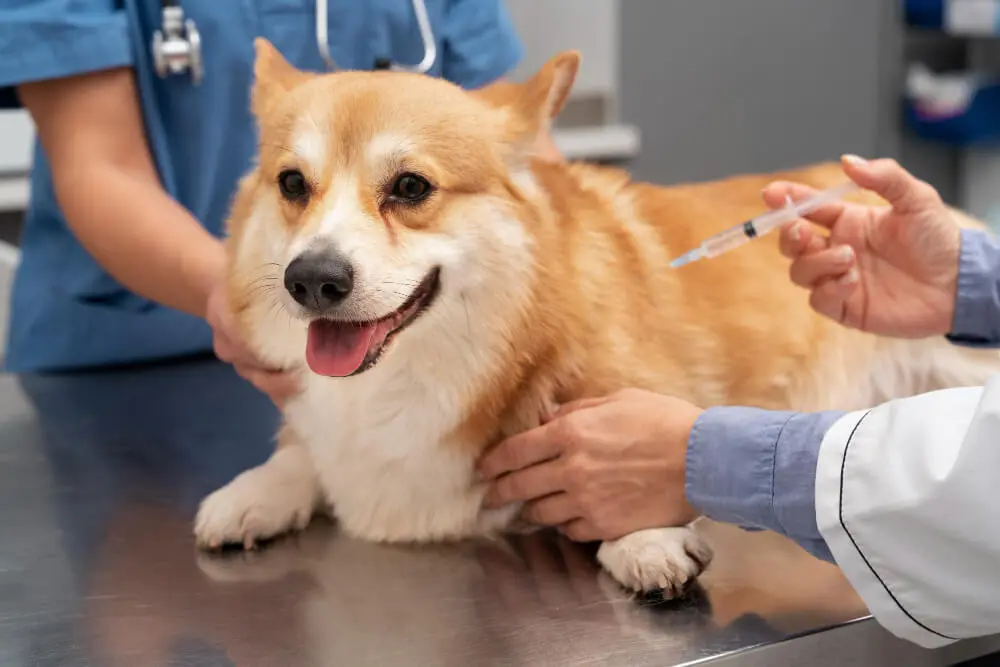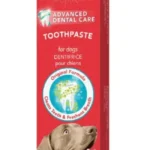As responsible pet owners, we strive to provide our beloved dogs with the best care possible. This responsibility includes ensuring they receive vaccinations to protect against various diseases. While vaccinations are crucial for their health and well-being, you may have noticed dog behavior change after vaccination. Let us look into dog behavior changes after vaccination, shedding light on what is considered normal and when you should seek veterinary advice. By understanding these changes, you can provide the best support for your furry friend during this time.
The Vaccination Process: A Brief Overview
Before we get deep into reasons for dog behavior change after vaccination, let us first understand the vaccination process itself. When your dog receives a vaccine, it stimulates their immune system to produce antibodies that protect against specific diseases. Vaccines are typically administered via injection in various sites like the neck or hind leg scruff.
How Does Vaccination for Dogs Work?
The fundamental principle behind dog vaccination is similar to that of humans. The vaccine introduces a small, safe piece (often an inactivated or weakened form) of the disease-causing organism into the dog’s body.
This stimulates the dog’s immune system to recognize this organism as a threat, producing antibodies to fight it. Exposure to disease-causing organisms prepares the immune system to recognize and combat these diseases swiftly in the future.
Vaccination equips the dog’s immune system with the ability to resist or fight off potential future infections. It’s important to note that vaccines are specifically tailored to combat common canine diseases and are designed with your dog’s safety and health in mind.
Normal Behavioral Responses
If you have taken your pup for shots, you may have noticed some dog behavior change after vaccination. It’s important to note that experiencing some degree of behavioral change after vaccination is relatively common for dogs. These responses are usually temporary and resolve within a couple of days. Let’s take a closer look at some typical behavioral changes you might observe:
- Lethargy or Sleepiness
After receiving a vaccine, it’s not uncommon for dogs to feel tired or sleepy. Lethargy is a natural response as the body processes and responds to the vaccine antigens in its system.
- Mild Discomfort at the Injection Site
Dogs may experience mild discomfort or soreness at the injection site, like any other injection. They might exhibit signs such as licking or scratching at the area, which is their way of trying to alleviate any irritation.
- Decreased Appetite
Some dogs may experience a temporary decrease in appetite following vaccination. This change is often due to mild gastrointestinal upset or the body’s response to the vaccine antigens.
- Low-Grade Fever
Occasionally, dogs may develop a low-grade fever after vaccination. This mild elevation in body temperature is a normal immune response as the body processes and reacts to the vaccine.
Understanding these normal behavioral responses can help alleviate concerns when you notice changes in your dog after vaccination. However, being aware of signs indicating an adverse reaction requiring veterinary attention is crucial.
Recognizing Signs of Adverse Reactions
While dog behavior change after vaccination is normal, and dogs generally tolerate vaccines well, there is a slight possibility of adverse reactions. It’s essential to be vigilant and recognize any signs indicating an abnormal response. If you observe any of the following symptoms after your dog’s vaccination, it’s recommended to consult your veterinarian:
- Severe Lethargy or Weakness
If your dog seems excessively lethargic or weak, experiencing difficulty walking or standing, it could be a cause for concern. This level of lethargy goes beyond what is typically expected and warrants immediate veterinary attention.
- Vomiting or Diarrhea
While mild gastrointestinal upset can be expected in some cases, persistent vomiting or diarrhea can indicate an adverse reaction. Excessive fluid loss from either end should never be ignored.
- Difficulty Breathing or Swelling
Allergic reactions can occur after vaccination, leading to difficulty breathing, swelling around the face or throat, hives, or collapse. These signs require immediate medical intervention.
- Persistent Pain at the Injection Site
While mild discomfort is common at the injection site, persistent pain that lasts beyond a couple of days should not be ignored. Excessive redness, heat, swelling, or discharge indicate that veterinary advice is needed.
Yes, it is normal for dogs to exhibit some soreness after vaccination. As with any injection, the vaccine is administered into your dog’s body using a needle, which can cause discomfort. Some dogs may experience localized pain at the injection site, demonstrating signs such as licking or scratching the area – their way of trying to relieve the irritation. This mild discomfort should subside within a couple of days.
However, if the pain persists beyond this period or the site becomes excessively red, hot, swollen, or discharges pus, it’s advisable to seek veterinary attention, as these could indicate an adverse reaction.
How Long After A Shot Can A Dog Have Side Effects?
Side effects post-vaccination in dogs can occur almost immediately or may take a few hours to a few days to appear. Most often, if a dog is going to react, it will occur within the first-hour post-vaccination, which is why many veterinarians recommend keeping your pet at the clinic for a short period after receiving vaccines.
Nevertheless, some side effects, such as soreness at the injection site or lethargy, may not become evident until a few hours or a day post-vaccination. In rare cases, delayed reactions can occur several days to weeks later. Regardless of the timing, any abnormal behavior or symptoms observed post-vaccination should be reported to your veterinarian immediately.
Why Is My Dog Having Trouble Walking After Shots
Sometimes, your dog might experience difficulty walking after receiving their vaccinations. This is typically due to localized pain or discomfort at the injection site, which can make movement uncomfortable. It could also be a sign of a more serious adverse reaction, especially if other symptoms like severe lethargy, vomiting, diarrhea, or difficulty breathing accompany it.
If your dog is having noticeable trouble walking post-vaccination, it’s best to contact your vet immediately. They can provide guidance and, if necessary, examine your dog to ensure their well-being. Always remember to exercise extreme caution regarding your pet’s health.
Why Did My Dog Get Aggressive After Shots
While uncommon, dog behavior change after vaccination can sometimes include increased aggression. This is usually a result of physical discomfort or anxiety associated with the vaccination process rather than a direct effect of the vaccines themselves.
If your dog appears more aggressive after receiving shots, it could react to pain or discomfort, mainly if the injection site is sore. Additionally, some dogs might feel stressed or anxious during veterinary visits, which could temporarily heighten their defensive behaviors.
However, this is typically short-lived and subsides once they return to a familiar and comfortable environment. If you notice sustained aggression or any significant behavioral changes post-vaccination, it’s essential to consult your veterinarian to assess and address any potential underlying issues.
Can Rabies Shots Change Dogs’ Behavior, and Which Shots Are the Most Painful?
Like other vaccines, Rabies vaccines may lead to short-term behavioral changes in dogs. These changes, including mild lethargy and decreased appetite, are typically transient due to the immune system’s response to the vaccine.
The behavior should return to normal within a few days. Still, it’s important to note that a severe change in behavior is not common and could indicate an adverse reaction to the vaccine, requiring immediate veterinary attention.
In terms of pain, it’s challenging to quantify which vaccines dogs find most painful as they cannot express their feelings as we can. Each dog may respond differently to different vaccines. However, certain vaccines, such as Leptospirosis or Bordetella, are often reported to cause more discomfort at the injection site, possibly because these vaccines are bacterins, meaning they contain bacterial antigens. Rabies vaccinations can also cause soreness or swelling at the site of injection.
Constantly monitor your dog for several hours after vaccination, and if you notice any signs of distress, discomfort that doesn’t improve within a day or so, or any other concerning symptoms, reach out to your veterinarian promptly.
Managing Behavioral Changes and Promoting Comfort
To help your furry companion through behavioral changes following vaccination:
- Provide a calm and quiet environment: Creating a peaceful space for your dog will help them rest and recover from discomfort.
- Offer extra comfort: Provide your dog with their favorite blanket or bed, ensuring they have a cozy relaxing spot.
- Monitor food and water intake: While temporary decreased appetite is normal, ensure your dog stays hydrated. Also, offer small, palatable meals that give them the right nutrition or treats they love.
- Gentle exercise: Engage in low-impact activities or short walks to keep your dog’s muscles active without causing excessive strain.
- Administer medications if prescribed: If your veterinarian recommends any medications to alleviate discomfort or manage symptoms, follow their instructions carefully.
By following these practices, you can support your dog during this time and help them return to their usual happy and healthy selves.
Do’s and Don’ts After Dog Vaccination
Following your dog’s vaccination, it’s essential to bear in mind some key do’s and don’ts to ensure their well-being:
Do’s
- Do Monitor Your Dog: Keep a close eye on your dog for a few days following the vaccination, looking out for any signs of adverse reactions.
- Do Maintain Hydration: Ensure your dog has constant access to fresh water to stay hydrated, especially if they experience side effects like vomiting or diarrhea.
- Do Provide Comfort: Offer extra comfort and care to your pet. Pamper them with their favorite toys or treats to help them feel secure and loved.
- Do Report Any Concerning Symptoms to Your Vet: Contact your vet immediately if you notice any abnormal behavior or severe symptoms.
Don’ts
- Don’t Overexert Your Dog: Avoid strenuous exercise and let your dog rest. Their body needs energy to build immunity.
- Don’t Ignore Symptoms: Never overlook any changes in behavior, no matter how minor they may seem.
- Don’t Delay Seeking Medical Help: If your dog shows signs of a severe allergic reaction, seek immediate veterinary assistance.
- Don’t Skip Future Vaccinations: Do not let this experience deter you from future vaccinations; they are vital for your dog’s health. Discuss any concerns with your vet.
Adhering to these dos and don’ts can help your dog navigate the post-vaccination phase easily. You can also ensure the dog behavior change after vaccination only for a short while, as you ensure they remain healthy and protected.
Conclusion
Observing dog behavior change after vaccination is not uncommon, but it’s essential to differentiate between normal responses and signs of adverse reactions. Understanding what is considered typical can provide reassurance during this period of adjustment. Remember, keeping a close eye on your furry friend and seeking veterinary advice when necessary ensures their well-being and continued good health.





